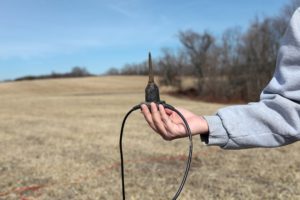All Categories
Featured
Table of Contents
Geophysical Survey Methods in Wexcombe Oz 2020
This work is progressively contracted out, so consultancies offer another source of work. Consultancy companies vary in size, from extremely little business to big multinationals. Some consultancies are rather specialised in using specific geophysical strategies or operating in specific areas, while others use a more diverse variety of services to their clients.
The extraction of gas from land fill websites is another location of work and this may grow in the future. Expedition business might carry out work for construction firms, public utility, mining business and environmental agencies, so geophysicists may be employed in any of these settings. Other companies consist of: geological surveysgovernment bodies and agenciesuniversities and research study institutes.


Vacancies may be listed in the oil and gas sector press. Recruitment is affected by oil price changes and the level of competition for positions differs depending upon this. Careers Days, which cover the full series of geoscience careers and are generally gone to by a variety of crucial industry employers, are run by The Geological Society.
Geophysical Survey: Plotting Buried Traces Of Human Activity in Bedfordale WA 2020
A few of the big oil and gas companies use a complete two-year structured training program across the breadth of geophysics, including the opportunity to experience work in various teams prior to specialising in one area. Your training might include work on: existing wellsmagnetic and gravitational possible field data analysisresearchrock analysis. It's more normal for your preliminary training to be provided on the task.

There might be a probationary duration during which you work alongside a skilled coworker. Competency-based appraisals happen frequently in most firms. In smaller sized companies, and for academic posts, there is unlikely to be any formal training - you'll be expected to begin work straightaway and select up skills as you go along.
If you work for a smaller sized business, you may find that you require to take duty for organizing and funding your own advancement and training. If you have a geology degree, subscription of The Geological Society can be helpful for networking and for keeping up to date with the industry.
Working As A Geophysicist And Oceanographer In Canada in Coolbinia Australia 2020
You might likewise find it beneficial to join the PESGB (The Petroleum Exploration Society of Great Britain, which has a geophysics special interest group. After a probationary duration, and as soon as you've gotten some experience, you could progress to senior geophysicist, then team leader and after that into a senior role in management.
The ease of motion in between roles depends on the business structure. Research study at Masters or Ph, D level in a subject related to geophysics or geosciences might assist with your profession development and progression. The employment market within the oil and gas market is very based on cost and this might impact your chances for profession development.
For knowledgeable geophysicists, freelance consultancy provides a good route for career advancement. As a geophysicist, you're likely to have numerous tasks throughout your working life.
Field Geophysicist - Parsons Careers – Engineered Systems in Attadale WA 2021
From geophysics, it's possible to focus on seismology (completing further training to become a seismic interpreter) or to move into related locations such as engineering geology or hazard forecast.
Deciding what to study in college is a tough option. Even if you know that your field of interest lies in science, what program of research study is best for you?
However the first step to achieving your objective of ending up being a geophysicist is making a degree. Even for entry-level positions in the field of geoscience, you'll need a bachelor's degree (a geophysicist college degree) from a recognized college or university. Some research positions need prospects to hold master's degrees or even Ph.
About Environmental Geophysics in West Perth Oz 2020
Doctoral degrees are particularly important if you prepare to teach at a four-year organization. Geophysicists apply physics ideas and techniques to study the gravitational, magnetic, and electrical fields of the earth. This furthers researchers' understanding of both the planet's interior core and its surface. Geophysicists must have the ability to: evaluate rocks, pictures, and other pieces of data carry out research both in the field and in labs produce maps and charts of their findings write reports To achieve all this, students require a specialized education for geophysicist professions.
As mentioned above, you'll require a bachelor's degree in geoscience or an associated discipline, such as a physical science or a natural science, to land an entry-level job. However students can also prepare by learning subjects like: Biology Chemistry Computer system science Engineering Mathematics Physics The above geophysicist majors use a more generalized technique to a single scientific discipline, but the majority of programs require students to take one or more geology course.
Latest Posts
Geophysical Survey in Jandakot Australia 2020
Geophysics Definition & Meaning in Roleystone Oz 2021
Geophysical Survey - Explore The Seafloor in Kinross WA 2021